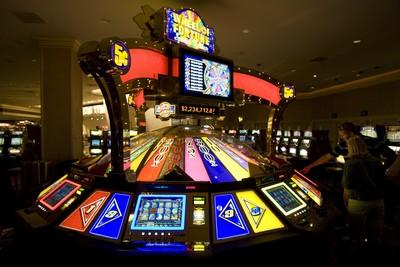IGT’s earnings up, sales down
Slot machine giant International Game Technology boosted earnings during its second quarter but a decline in game sales domestically and internationally disappointed Wall Street.
Nevertheless, executives with the Reno-based gaming manufacturer tried to strike a positive note for investors who are holding onto the company's stock for the long term.
IGT reported earnings for the quarter that ended March 31 of $128.2 million, or 38 cents per share, up from earnings of $124 million, or 35 cents a share, a year ago. Analysts polled by Thomson First Call estimated the company would earn 36 cents per share in the quarter.
A gain of $13.5 million, mostly related to an insurance settlement for property damaged during the 2005 Gulf Coast hurricanes, helped the earnings.
Revenues fell 5.4 percent, to $609.7 million from $644.4 million, due primarily to decreases in slot machine sales. IGT shipped about half as many slot machines during the second quarter as it did during the 2006 second quarter.
However, in gaming operations in which IGT jointly shares with casinos in the profits produced by its slot machines, the company said revenues were $341.1 million, an 8 percent increase compared with $311.2 million last year.
IGT said its installed base of the revenue-sharing slot machines was 54,800 games at the end of March, an increase of 10,400 machines compared with the 2006 second quarter and a jump 1,700 machines over the 2007 first quarter.
"Although the current macro-trends for domestic machine sales remain challenging, the strength and consistency of our gaming operations business and the steadily growing contributions from our international operations enhance IGT's ability to generate strong operating cash flow," IGT Chairman TJ Matthews said in a statement.
IGT also announced it was repurchasing 50 million of its shares from the market, bringing the company's total authorized stock repurchase program to 53.1 million shares.
"We reaffirm our confidence and optimism in the long-term future of our company and plan to continue our stock buyback program as part of our ongoing strategy to return significant capital to our shareholders," Matthews said.
Gaming analyst Steven Wieczynski of Stifel Nicolaus Capital Markets said the stock repurchase, "shows management's confidence going into the second half of 2007."
While shares of IGT traded down more than 4.5 percent initially on the earnings announcement, the stock rebounded on the New York Stock Exchange to close at $39.30, down 40 cents, or 1.01 percent. More than 16.7 million shares of IGT were traded, 5 1/2 times the average daily volume.
Gaming analysts, while somewhat discouraged by the decline in overall revenues, weren't shocked IGT had a tough time selling new games during the first half of 2007.
"Despite low expectations, product sales revenues and gross operating profits were disappointing," Bear Stearns gaming analyst Joe Greff said.
Goldman Sachs gaming analyst Steven Kent said Japan decided to push new product installments into the year's second half, which was one of the reasons for IGT's shortfalls from lack of international sales in the quarter. Kent hadn't been expecting much in the way of sales to American casinos.
"This is not overly surprising considering the lack of new casino openings and replacement demand in the U.S.," Kent said in a note to investors. "When we turned more bullish on IGT, we highlighted it as a longer term call because the near-term opportunities would be limited due to challenges in its core domestic market."
Wieczynski said he expects IGT performance in the year's second half to exceed the first six months.
"IGT remains our top pick in the gaming and leisure space," he said in an investors note. "We continue to believe that the second half of 2007 will be the perfect storm as strong international gaming growth coupled with some domestic markets blossoming should help bridge the gap until the next replacement cycle."






















